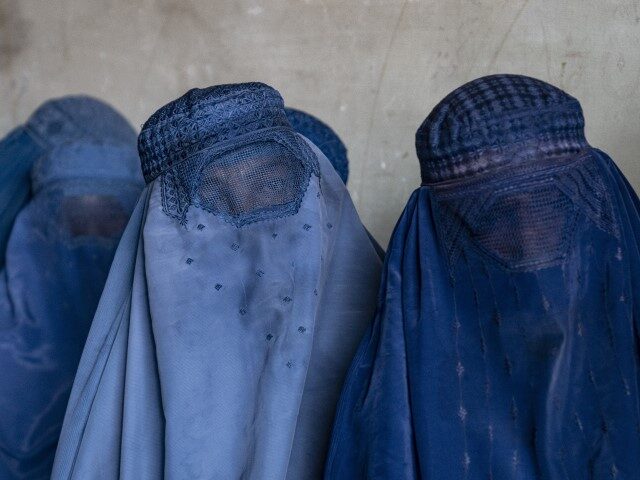The Taliban terrorist organization governing Afghanistan issued a decree on Thursday banning women from showing their faces, and speaking loudly enough to be heard, in public.
The decree, passed by the Taliban’s “Ministry of Vice and Virtue,” arrived almost exactly three years after the jihadists, fresh from seizing control of the country after President Joe Biden’s decision to extend the 20-year Afghan War, promised international observers they would build an “inclusive” government for all Afghans. Taliban spokesmen specifically insisted that they would respect women’s rights – though with the significant caveat that women’s rights can only exist “within the framework” of their fundamentalist interpretation of sharia, or Islamic law.
Taliban leaders celebrated the third anniversary of the fall of the U.S.-backed government in Kabul on August 15. Taliban jihadists ruled Afghanistan for much of the 1990s but were ousted in the aftermath of the September 11, 2001, attacks on the U.S. homeland. Former President Donald Trump brokered an agreement with the Taliban that would have seen American troops peacefully withdraw from the country on May 1, 2021. Biden broke the deal, prompting the Taliban to launch a campaign to conquer the entire nation that forced American troops to frantically escape the terrorists in the final days of August 2021.
The Biden withdrawal resulted in the deaths of 13 American servicemembers, caught in a suicide bombing at Kabul’s international airport on August 26.
The Taliban has since remained the uncontested government of Afghanistan, though no other state power, nor the United Nations, has officially recognized it as such. A growing number of countries led by China have since accepted Taliban ambassadors to their official Afghan embassies and expanded trade ties with the jihadists, strengthening their stranglehold on power. China and Iran also sent representatives to the Taliban’s conquest anniversaries last week on the former U.S. airbase Bagram.
The Taliban’s “Ministry of Justice” confirmed that the new decree on dress codes and other social behavior would officially be the law of the land beginning this week. Ministry spokesman Barkatullah Rasooli detailed the new provisions in the decree, according to the Afghan outlet Tolo News.
“According to this law, the aforementioned ministry is obliged to command the good and forbid the evil in accordance with Islamic Sharia and Hanafi jurisprudence,” Rasooli said, “and is also responsible for ensuring peace and brotherhood among the people while preventing them from engaging in ethnic, linguistic, and regional prejudices.”
For women, the Taliban made it illegal to leave the house without covering their faces “due to the fear of causing temptation.”
“The loud voice of women is also considered a part of their modesty,” Tolo News explained. “The law also states that it is prohibited for drivers to transport adult women without a legal male guardian.”
The “loud voice” prohibition bans “loud singing, chanting, and recitation” in addition to merely speaking. Women must also not only hide their entire faces but entirely “conceal their bodies.”
The new provisions also mandate men follow stringent dress and fashion codes. The Taliban banned men from wearing Western-style neckties, “trimming the beard below a fist’s length,” or having non-sharia-compliant hairstyles. Taliban leaders revealed this week they had dismissed 280 of its jihadists for “hairstyle violations,” including not sporting beards or having hair of an unsatisfactory length. Those dismissed reportedly had 24 hours to address their hair problems if they wished to return to their posts.
The decree also closely governs the personal lives of Afghans, banning Muslims from having “friendships” with any non-Muslims.
Tolo News noted that the Taliban appears to have studied the possibility of banning all communications, but instead formalized strict laws against the “misuse of typewriters, radios, and other similar objects.” Journalists also face brutal punishment if found to “humiliate or insult Muslims” and all media in the country is no longer allowed to show “images of living beings.”
On the day the decree was announced, Minister of Vice and Virtue Mohammad Khalid Hanafi issued public statements insisting the terrorists would make “no compromise” on enforcing their repressive interpretation of sharia.
“The implementation of Sharia and Hijab is our red line. We cannot negotiate with anyone on these matters,” Hanafi insisted. “God forbid, if someone says not to promote virtue and prevent vice, or to abandon the issue of Hijab, and in return, they will engage with us and recognize us, then why did we sacrifice for twenty years?”
The Taliban has consistently since its return to power claimed that it would enforce women wearing hijab, a headscarf covering only hair, with few mentions of the niqab or burqa, which cover the face. As recently after the fall of Kabul as 2022, however, Taliban leaders were insisting that women’s faces should never be visible in public, nor should they leave their house unless absolutely necessary.
“It is very bad to see women in some areas, and our scholars also agree that women’s faces should be hidden,” Ministry of Vice and Virtue spokesman Molvi Mohammad Sadiq Akif scolded in 2023. “It’s not that her face will be harmed or damaged. A woman has her own value and that value decreases by men looking at her.”
The tone contrasted significantly with the promise of “inclusivity” Taliban leaders offered in 2021.
“We will do our most to make sure that everybody is included in the country, even those people against us in the past, so we are going to wait until those announcements are made,” top spokesman Zabihullah Mujahid said in the days following the fall of Kabul.
On women, he insisted, “Of course, they will be able to work within the frameworks of our Islamic laws, for example in education, in health, in prosecution. Of course, women are needed, they are going to be able be [sic] working.”
Follow Frances Martel on Facebook and Twitter.




